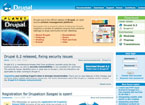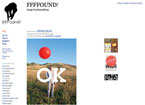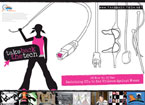| |
|
|
|
|
||
|
||||||||||||||||||||

DIGITAL COMMUNITIESThe "Digital Communities" category will honor important achievements by digital communities well as innovative artistic approaches towards web-based communities. This category focuses attention on the wide-ranging social and artistic impact of the Internet as well as on the latest developments in the fields of social software, ubiquitous computing, mobile communications and p2p production. Special attention goes to community-related “net.art”. "Digital Communities" spotlights bold and inspired innovations impacting human coexistence, bridging the geographical as well as gender-based digital divide and cultural conflicts, sustaining cultural diversity and the freedom of artistic expression or creating outstanding social software and enhancing accessibility of technological-social infrastructure. This category showcases the political and artistic potential of digital and networked systems and is thus designed as a forum for the consideration of a broad spectrum of projects, programs, artworks, initiatives and phenomena in which social and artistic innovation is taking place, as it were, in real time. A Golden Nica, two Awards of Distinction and up to 12 Honorary Mentions will be awarded in the Digital Communities category in 2009.   
DIGITAL COMMUNITIES - WHAT ARE THEY? SUBMISSION WHO CAN SUBMIT AN ENTRY? NICA WINNERS 2004 - 2007 DIGITAL COMMUNITIES - WHAT ARE THEY?Digital Communities, whether with social or artistic background, give rise to group action and interaction, engender constructive contexts and social capital, and promote social innovation as well as cultural and environmental sustainability. An essential precondition for this is making the respective relevant technologies and infrastructure more widely accessible or perhaps even developing them in the first place. But access to content and information is also a crucial topic. Digital Communities take part in efforts to achieve comprehensive human development, a key aspect of which is reconfiguring the relationship of power between citizens and political leaders, the state and its administrative bureaucracy as well as financial and commercial interests in the sense of increasing participation, strengthening the role of the civil sector, and establishing a framework for democracy and artistic work to flourish SUBMISSIONThe "Digital Communities" category is open to political, social, cultural and artistic projects, initiatives, groups, and scenes from all over the world utilizing digital technology to better society and assume social responsibility. It is meant to recognize the initiators and propagators of these communities as well as the developers of the relevant technologies, and to honor those whose work contributes to the establishment and proliferation of digital communities as well as provide understanding and research into them. A Golden Nica will be awarded in order to recognize the vast array of relevant projects between grassroots operations and professional solutions, the diversity of approaches and aspects from community innovation to social software excellence as well as the broad spectrum of submitters involved, ranging from private initiatives to public institutions. Particular emphasis will be placed on a project's "community innovation," its sustainability in terms of cultures, environment and economy, and its appropriate use of technology enabling and empowering the actual users, creating novel methods for connecting already existing technology or optimizing the use of an available infrastructure. Jury members will be looking to recognize technological-social solutions, "social software tools," artistic and cultural endeavors as well as socio-technological infrastructure with great promise, as well as the brilliant realization of such concepts. Their evaluations and decisions will honor visionary and forward-looking projects and artworks; those that display consummate social and technological innovativeness and that have been successfully set up and established. In their selection, the jury will place particular emphasis on the reasonableness, appropriateness, and openness of the solutions. Digital Communities projects should enable human beings to enjoy the widest possible access to technology, networks, content, and the "Digital Commons." The Jury gives particular consideration to net-based artworks and net.art-projects with sociopolitical relevance. Network art projects must constitute artistic confrontations with the technical and cultural characteristics of the Internet and go beyond simply using the Web as a platform for the dissemination of content. Thus, the Internet’s system-immanent qualities should serve as the basis of the artistic approach taken by a submitted work. The winning projects should be able to serve as a model to be copied by others, and, in their orientation on the future, be a source of inspiration, encouragement, and enablement. Among the projects, phenomena, artworks and fields of activity subsumed under the heading Digital Communities are:
WHO CAN SUBMIT AN ENTRY?Individuals, groups, associations, public institutions and private enterprises are eligible to enter their projects. Such projects must, at the time of the judging, be active, extant communities, and must be verifiable through online representation or documentation. NICA WINNERS 2004 - 2008
The World Starts with Me ( http://www.theworldstarts.org ) |

The Winners of Prix Ars Electronica 2002 
Net Vision / Net Excellence at Prix Ars Electronica  |
| © Ars Electronica Linz GmbH, info@aec.at |